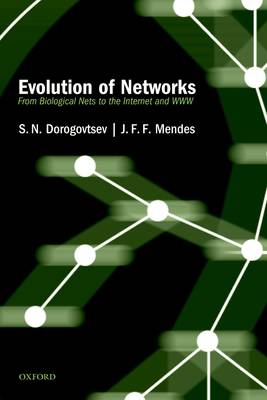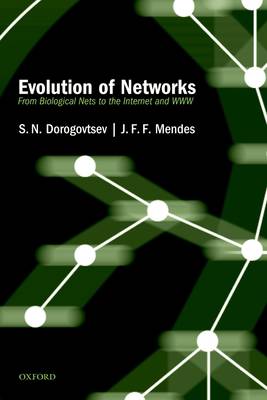
Door een staking bij bpost kan je online bestelling op dit moment iets langer onderweg zijn dan voorzien. Dringend iets nodig? Onze winkels ontvangen jou met open armen!
- Afhalen na 1 uur in een winkel met voorraad
- Gratis thuislevering in België vanaf € 30
- Ruim aanbod met 7 miljoen producten
Door een staking bij bpost kan je online bestelling op dit moment iets langer onderweg zijn dan voorzien. Dringend iets nodig? Onze winkels ontvangen jou met open armen!
- Afhalen na 1 uur in een winkel met voorraad
- Gratis thuislevering in België vanaf € 30
- Ruim aanbod met 7 miljoen producten
Zoeken
Evolution of Networks
From Biological Nets to the Internet and WWW
S N Dorogovtsev, J F F Mendes
Paperback | Engels
€ 78,45
+ 156 punten
Uitvoering
Omschrijving
We live in a world of networks, where everything is amazingly close to everything else. The notion of 'network' turns out to be central to our times: the Internet and WWW are changing our lives; our physical existence is based on various biological networks; we are involved in all-enveloping networks of economic and social relations. Only in the 1990s did physicists begin to explore real networks, both natural and artificial, as evolving systems with intriguingly complex and effective architectures. Progress has been so immediate and astounding that we actually face a new science based on a new set of concepts, and, one may even say, on a new philosophy: the natural philosophy of a small world. Old ideas from mathematics, statistical physics, biology, computer science, and so on take on quite new forms in applications to real evolving networks. - What is common to all networks?
- What are the general principles of the organization and evolution of networks?
- How do the laws of nature work in communication, biological, and social networks?
- What are networks? This book, written by physicists, answers these questions and presents a general insight into the world of networks.
- What are the general principles of the organization and evolution of networks?
- How do the laws of nature work in communication, biological, and social networks?
- What are networks? This book, written by physicists, answers these questions and presents a general insight into the world of networks.
Specificaties
Betrokkenen
- Auteur(s):
- Uitgeverij:
Inhoud
- Aantal bladzijden:
- 280
- Taal:
- Engels
Eigenschappen
- Productcode (EAN):
- 9780199686711
- Verschijningsdatum:
- 14/01/2014
- Uitvoering:
- Paperback
- Formaat:
- Trade paperback (VS)
- Afmetingen:
- 231 mm x 157 mm
- Gewicht:
- 462 g

Alleen bij Standaard Boekhandel
+ 156 punten op je klantenkaart van Standaard Boekhandel
Beoordelingen
We publiceren alleen reviews die voldoen aan de voorwaarden voor reviews. Bekijk onze voorwaarden voor reviews.











